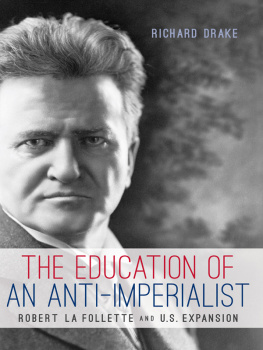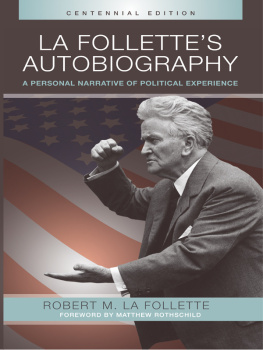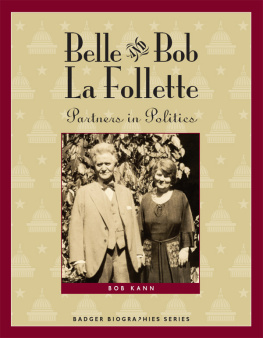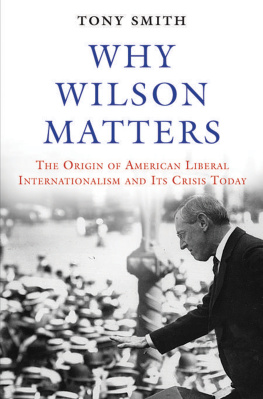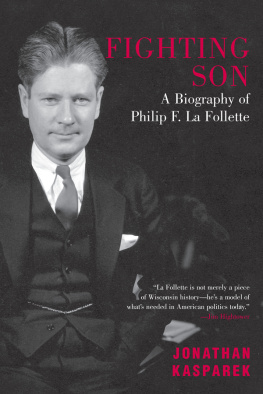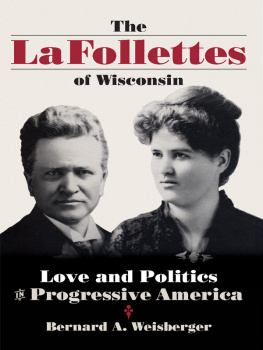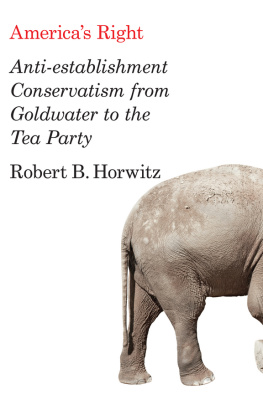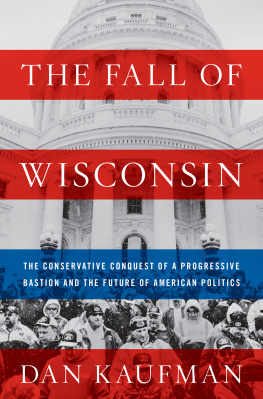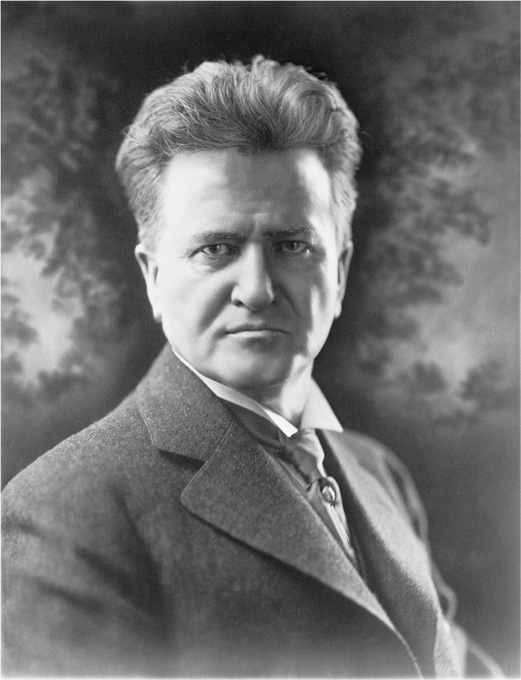
Robert M. La Follette, 1915 (Album 25 [Robert M. La Follette and Family], Wisconsin Historical Society, WHi-11015)
The Education of an
A NTI -I MPERIALIST

Robert La Follette and U.S. Expansion
Richard Drake
THE UNIVERSITY OF WISCONSIN PRESS
The University of Wisconsin Press
1930 Monroe Street, 3rd Floor
Madison, Wisconsin 53711-2059
uwpress.wisc.edu
3 Henrietta Street
London WC2E 8LU, England
eurospanbookstore.com
Copyright 2013
The Board of Regents of the University of Wisconsin System
All rights reserved. No part of this publication may be reproduced, stored in a retrieval system, or transmitted, in any format or by any means, digital, electronic, mechanical, photocopying, recording, or otherwise, or conveyed via the Internet or a website without written permission of the University of Wisconsin Press, except in the case of brief quotations embedded in critical articles and reviews.
Printed in the United States of America
Library of Congress Cataloging-in-Publication Data
Drake, Richard, 1942.
The education of an anti-imperialist : Robert La Follette and U.S. expansion /
Richard Drake.
pages cm(Studies in American thought and culture)
Includes bibliographical references and index.
ISBN 978-0-299-29524-0 (pbk. : alk. paper)ISBN 978-0-299-29523-3 (e-book)
1. La Follette, Robert M. (Robert Marion), 18551925Political and social views.
2. Imperialism. 3. MilitarismUnited States. I. Title. II. Title: Robert La Follette
and U.S. expansion. III. Series: Studies in American thought and culture.
E664.L16D73 2013
325.320973dc23
2013015106
IN MEMORY OF
Ezio Cappadocia,
il mio primo amico
CONTENTS
ACKNOWLEDGMENTS
During the five years spent on this books preparation, I accumulated a large number of professional and personal debts. I would like to acknowledge them here. Of the many historians who assisted me, I owe the greatest debt to Walter LaFeber, the Andrew H. and James S. Tisch Distinguished University Professor Emeritus at Cornell University. At an early stage of the book, he encouraged me to think that I had a project worth doing. Coming from a master in the field of American history, his encouragement sped me along the path that I had marked out for myself. His careful scholarly reading of the chapters that I sent him introduced me to a level of collegiality in the history profession unexampled in my experience. The only way to repay such a debt is to try to follow his generous example. I also have ample cause to thank Richard Baker, a past historian of the United States Senate, for his penetrating criticism of the chapter that I gave him. Richard and his wife, Pat, kindly invited me and my wife, Laure Pengelly Drake, to stay in their home on one of my research trips to Washington, D.C. Two readers for the University of Wisconsin Press, Lloyd C. Gardner, the Charles and Mary Beard Professor of History Emeritus at Rutgers University, and Susan Brewer, Professor of History at the University of WisconsinStevens Point, rendered evaluations of my manuscript that greatly broadened my understanding of the major historical events of Robert La Follettes times. They also made excellent suggestions for tightening the text. I want to thank them and my editor, Gwen Walker, for a model experience with a university press. Also deserving of special notice at the University of Wisconsin Press are my copyeditor, Jane Curran; the managing editor, Adam Mehring; the copy chief, Logan Middleton; the press director, Sheila Leary; and the Studies in American Thought and Culture editor, Paul S. Boyer, who passed away in 2012. Milton Leightenberg, Senior Research Scholar at the University of Marylands School of Public Policy, shared with me his encyclopedic statistical knowledge of Americas wars and gave me quantities of documents, articles, and books on this same subject. Among my colleagues at the University of Montana, I have a particular reason to thank Anya Jabour, who alerted me to the existence of documentation crucial for this study. Janet Sedgley, a computer systems analyst at the University of Montana, helped me to prepare the manuscript files for electronic transmission to the press. Greg Gordon, a former student at the University of Montana and now an assistant professor of environmental studies at Gonzaga University, shared with me his knowledge about current scholarship in nineteenth-century American history.
Librarians and archivists at the Library of Congress provided vital assistance in my research. For efficiency and cooperation, the Library of Congress set a standard unsurpassed and rarely equaled in the more than thirty years that I have worked as a historian. I wish especially to thank Bonnie B. Coles, Senior Searcher Examiner at the Library of Congress. She assisted me in collecting some of the photographs that appear in this book. Lisa Marine and John Nondorf at the Wisconsin Historical Society also treated me with exquisite professional courtesy in responding to my requests for photographs. John also did some deeply appreciated name-checking for me in the Wisconsin Historical Society archives. In the Butler Librarys Bakhmeteff Archive at Columbia University, Tanya Chebotarev guided me through the Charles Richard Crane papers and sent me the photograph of him that appears in this book. I wish to thank Thomas S. Crane for giving me permission to consult his grandfathers papers. Tom Cutterham of the Rothermere American Institute at Oxford University and Catherine McIntyre, Archives Assistant at the London School of Economics, aided me in finding a rare photograph of the British economist John A. Hobson. Tom also tracked down the photograph in Londons National Portrait Gallery of John Maynard Keynes and Lydia Lopokova. Archivist Patricia McGuire and Assistant Archivist Peter Monteith helped immeasurably to facilitate my work in the Personal Papers of John Maynard Keynes, Kings College Library, Cambridge. I wish to thank Professor Renato Moro, Professor Luigi Goglia, and Professor Maurizio Zinni at the Universit degli Studi Roma Tre for sending me the portrait of Francesco Saverio Nitti. Ken Grossi, College Archivist at Oberlin College, found the photograph of the King-Crane Commission. Robert M. Thornton, Secretary of the Nockian Society, sent me the photograph of Albert Jay Nock. Wesley W. Wilson, Coordinator of Archives and Special Collections at DePauw University, helped me to locate some important correspondence that Charles A. Beard had with Robert M. La Follette and Robert M. La Follette Jr. Head Archivist at the University of Montanas Mansfield Library, Donna McCrea, put her vast experience at my disposal locating essential research materials. The interlibrary loan staff, in particular Pamela Marek, unfailingly delivered the books and articles I needed. I also want to thank Glenn Kneebone of the Mansfield Library staff for his assistance in retrieving important documents for me from online sources. While serving as Provost, Royce Engstrom, current President of the University of Montana, gave me a semesters leave during which I did much of the research and writing for this book. Publication of this volume has been made possible, in part, through support from the University of Montana Office of Research and Creative Scholarship, presided over by Vice-President Scott Whittenburg.

